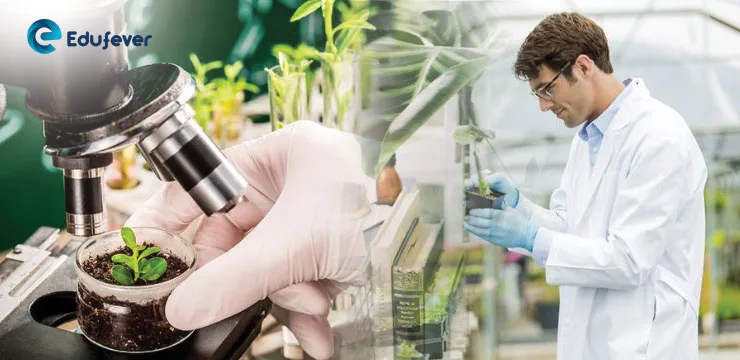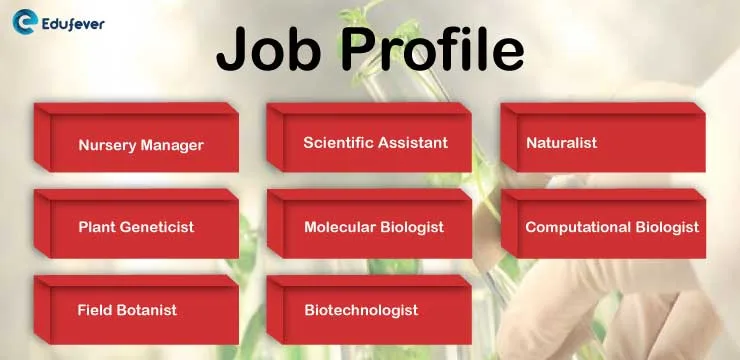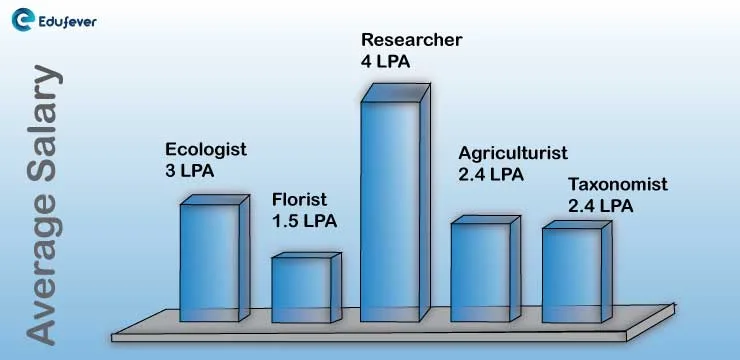Career in Botany in India: The famous Botanist Joseph Paxton once said, “Botany – the science of the vegetable kingdom, is one of the most attractive, most useful, and extensive departments of human knowledge. It is, above every other, the science of beauty”. Plants are the primary producers of the ecosystem we live in. Hence it is a must to know the basic things about plants, how they interact with the environment, and how they react to various herbivores and environmental disturbances. This article will give you an inside review of the career in Botany in India and the different Botany jobs available after doing Botany courses.
Individuals who pursued science in higher secondary education have likely received an introduction to Botany. For those who harbour a passion for plants and flowers, deriving joy from discovering new species and conducting experiments on them, Botany represents an ideal and fulfilling profession. If you’ve encountered the term “Botany” but are uncertain about its significance, this article aims to address all your queries regarding a career in Botany, as well as highlight the top colleges in India offering Botany courses.
[Page Index]
What is Botany?
‘Botany’ originated from the Greek word ‘Botane’, which means grass or fodder. Botany is the scientific study of plants—how they function, what they look like, how they are related to each other, where they grow, how people make use of plants, and how they have evolved. It also includes the study of algae, may deal with fungi and bacteria, and usually explores the lives of plants, from tiny floating algae to trees. After making a career in Botany, you can fetch valuable Information about the Plant Kingdom.
Who is a Botanist?
A Botanist, also known as a Plant Scientist, is an expert in the field of Botany. Plant Scientists delve into the internal functions and processes of plants at the cellular and tissue levels. Botanists employ molecular genetic analysis to classify plants, including examining a plant’s DNA sequence, proteomics, and genomics.

How the life of a Botanist differ from a normal person?
Distinct from other professions, Botanists harbour a deep love for nature, often developing an innate ability to communicate with the natural world. Their extensive understanding of plant physiology and anatomy enables them to perceive the rhythms and movements of plants. Engaging in Botany brings Botanists into intimate communion with Mother Nature, fostering a profound connection to the environment. The way a Plant Scientist observes a plant differs significantly from that of an ordinary individual. Becoming a Botanist offers both relaxation and fulfilment, as it allows one to immerse themselves in the captivating realm of plant life. If you share this excitement for Botany, now is the opportune moment to embark on a career in this field.
Roles of a Botanist
- Collecting and identifying samples of plants. You will be observing and maintaining records of plant species. You will be working on different sites to collect these samples. Identifying and further analysing these samples usually happen in specialised labs.
- Developing plant crops that are resistant to diseases, pests and drought. You could focus your research and efforts towards developing plant species that are better at fighting such external factors.
- Identifying insects and their interaction with plants. You will be diagnosing and analysing plant pests and pathogens from among these. You might also have to monitor the soil, water, and air quality.
- Identifying and isolating certain chemical substances from plants that can be useful for different purposes. These chemicals could be used in drugs, food, biofuels, fabrics, industry materials, etc.
- Using and handling complex equipment to study plant characteristics, genetics and other micro factors. For instance, you might need to use radioisotopes to analyse specific characteristics. You need to know how to use such equipment.
- Researching the effects of climate change and human interference activities like farming on plant species. You might even have to give your feedback and advice to the government or other relevant organisations about all these effects.
To Be A Botanist
You need to be
- Able to analyse and interpret data
- Practical
- Logical and methodical
- Good with numbers
- Flexible and adaptable
- Accurate and careful in recording results in the laboratory or in the field.
You should have
- A strong interest in plants and science
- Excellent analytical skills
- Good problem solving skills
- An enquiring mind
- Excellent attention to detail
- Good communication and team working skills
- Initiative to develop new ideas and solve problems
Various Botany Courses in India
To work as a Plant Scientist or to make a career in Botany, one can earn a degree in the following Botany course.
| Course Name | Duration |
|---|---|
| B.Sc. in Botany | 3 years |
| Certificate Courses in Botany | A few months to one year |
| M.Sc. in Botany | 2 years |
| Diploma in Applied Botany | 1 year |
| M.Phil. in Botany | 2 years |
| PhD in Botany | 3 years |
Admission Procedure
- Candidates must have completed 10+2 studies.
- Candidates must have studied English, Physics, Chemistry and Mathematics or Biology.
- The minimum percentage required in 10+2 is 55% to 60%.
Eligibility Criteria
The following are the eligibility criteria for botany courses. Let’s take a look.
| Particulars | Description |
|---|---|
| Qualification | 10+2 or equivalent with a science stream including English, Physics, Chemistry and Mathematics or Biology exam from a recognized board. |
| Qualifying Marks | Candidates should have a minimum of 55% aggregate marks. |
Top Colleges in India Offering Career in Botany
The following are the top colleges in India offering a career in botany course:
| College Name | Location |
|---|---|
| Delhi University | Delhi |
| Bharathiar University, Coimbatore | Kerala |
| BHU, Varanasi | Uttar Pradesh |
| Ramakrishna Mission Vivekananda Centenary College, Rahara, Kolkata | West Bengal |
| Madras Christian College | Tamil Nadu |
| Jamal Mohamed College | Tamil Nadu |
Job Opportunities for Botany Course
Though Botany offers multiple career options, it is necessary to understand practical concepts to have a better future as a Botanist. Various public sectors in India, such as the Botanical Survey of India (BSI), National Institute of Oceanography (NIO), Indian Agricultural Research Institute (IARI) and Indian Council of Forestry Research and Education (ICFR), offer numerous jobs for a Botanist every year. A Botanist can work as a Technical Assistant, Field Assistant or Scientific Assistant in private and government sectors. You could work in a wide range of industries including agriculture, environmental conservation, forestry, pharmaceuticals and food science
Job Profile
| Naturalist | Scientific Assistant |
| Molecular Biologist | Biotechnologist |
| Field Botanist | Plant Geneticist |
| Nursery Manager | Computational Biologist |

Average Salary
The following is the average salary for a Botany course:
| Job Profile | Average Salary |
|---|---|
| Ecologist | 3 LPA |
| Florist | 1.5 LPA |
| Researcher | 4 LPA |
| Agriculturist | 2.4 LPA |
| Taxonomist | 2.4 LPA |



I want to be a botanist but people says that if i wont get a high post in it so i will be finished so i think i am little nervous and worried too…???
No its not like that, there are ample opportunity in Botanist.